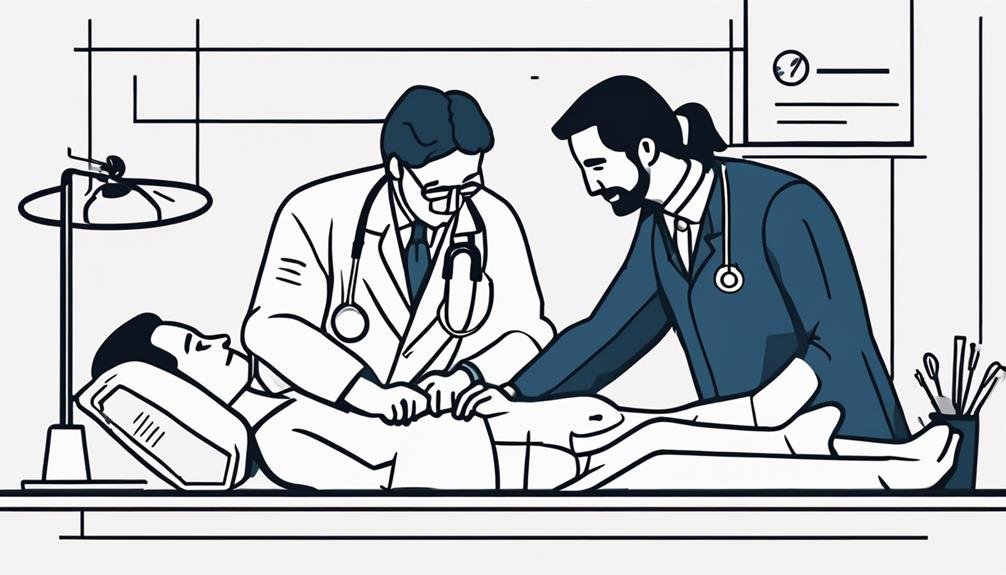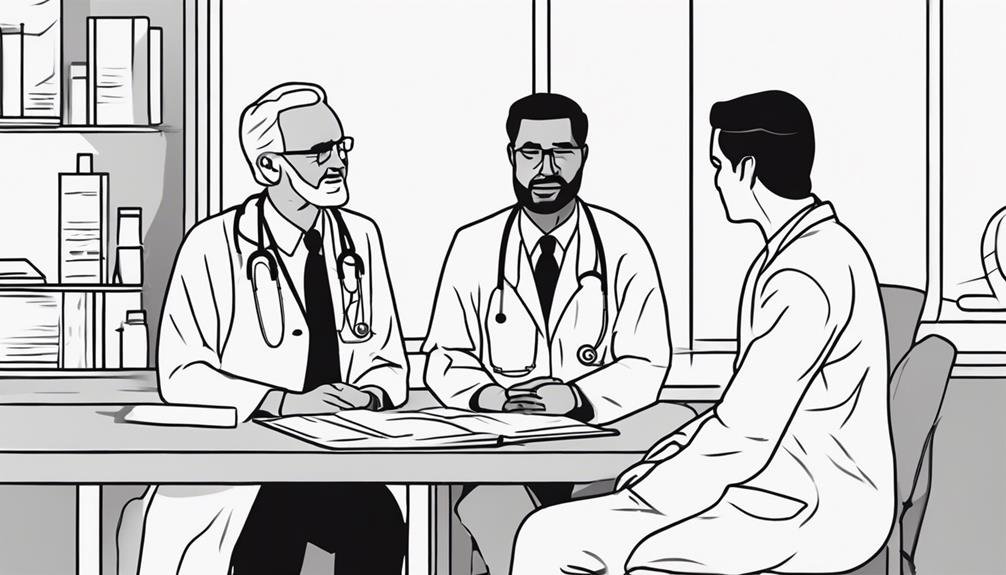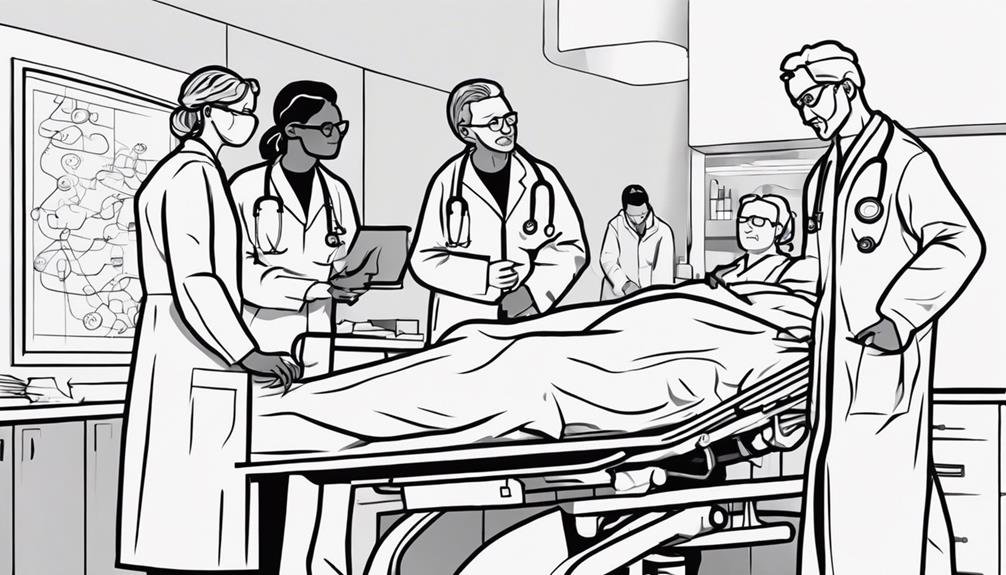To become a doctor, you need efficient communication to share complex medical details clearly, problem-solving for effective patient diagnosis, empathy to build trust, leadership for healthcare team coordination, and analytical skills to make informed decisions. Balancing these skills daily, showcasing problem-solving abilities in patient care, and emphasizing experiences in your field are essential. Communication skills with empathy, clear communication, collaboration, and non-verbal cues are indispensable. Soft skills like empathy, communication, leadership, stress management, and work ethic contribute to better patient care. Developing leadership qualities is pivotal for managing healthcare teams and ensuring high-quality patient care.
Key Takeaways
- Effective communication for patient interaction and teamwork.
- Problem-solving for diagnosis and treatment decisions.
- Empathy to build trust and rapport with patients.
- Strong leadership to coordinate healthcare teams.
- Analytical skills to interpret medical data accurately.
Essential Doctor Skills

For aspiring doctors, developing essential skills is a foundational step towards excelling in the medical field. Effective communication skills are important in conveying complex medical information to patients and colleagues. Alongside medical knowledge, problem-solving abilities are essential for diagnosing and treating patients efficiently. Empathy plays a significant role in building trust and establishing a strong patient-doctor relationship. Doctors must also possess strong leadership qualities to coordinate with healthcare teams effectively.
Analytical skills are necessary for interpreting medical data and making informed decisions. Adaptability is key in the ever-evolving field of medicine, requiring doctors to stay current with advancements. Proficiency in foreign languages can bridge cultural gaps and enhance patient care. Conflict resolution skills are valuable in dealing with challenging situations within medical teams.
To succeed, aspiring doctors must cultivate a diverse skill set encompassing interpersonal skills, adaptability, and a commitment to lifelong learning. These skills form the bedrock of a successful medical career.
Doctor Skills Application
As an aspiring doctor, the application of essential skills is where your journey truly takes shape. Balancing hard skills, such as medical knowledge and technical abilities, with soft skills like empathy and communication, is pivotal in daily medical practice. When diagnosing and treating patients, demonstrating a problem-solving mindset is vital to provide effective care. Highlighting educational, clinical, and research experiences in your job materials showcases your qualifications to potential employers. Tailoring your resumes to specific job requirements allows you to emphasize the skills most relevant to the roles you are applying for in the medical field.
Moreover, emphasizing your communication skills in job materials not only highlights your ability to interact effectively with patients but also showcases your capacity to collaborate with colleagues in a medical setting. By integrating a diverse range of skills and experiences in your applications, you can demonstrate your readiness to excel in diagnosing, treating, and caring for patients in a medical environment.
Communication Skills for Doctors

Effective communication skills are a cornerstone of a doctor's ability to convey complex medical information to patients in a clear and understandable manner. Compassion and empathy are vital in establishing trust and building a strong doctor-patient relationship. Being attuned to non-verbal cues and body language helps doctors convey empathy and understanding effectively. Clear and concise communication ensures patients grasp their diagnosis, treatment options, and follow-up instructions accurately. Additionally, strong communication skills are crucial for doctors to collaborate efficiently with colleagues, healthcare teams, and other stakeholders in the medical field.
| Communication Skills | Importance | Examples |
|---|---|---|
| Empathy | Builds trust and rapport with patients | Showing understanding and compassion |
| Clear and concise communication | Enhances patient comprehension | Using simple language and avoiding jargon |
| Collaboration | Enables effective teamwork in healthcare | Sharing information with colleagues |
Soft Skills for Physicians
Developing soft skills is vital for physicians to provide high-quality healthcare and improve patient outcomes. Soft skills such as empathy, communication, leadership, stress management, and work ethic are essential in the medical field. These skills not only contribute to better patient outcomes but also enhance the overall quality of care provided. Building trust through pleasant interactions and clear communication is necessary for effective patient care. Good leadership skills help in fostering teamwork and motivating healthcare teams to excel for better outcomes. Establishing rapport with patients through empathy and effective communication leads to successful healthcare outcomes. By honing these soft skills, physicians can create a more supportive and efficient healthcare environment, ultimately benefiting both patients and healthcare professionals. Embracing these qualities not only improves patient satisfaction but also facilitates a more cohesive and successful healthcare system.
Leadership Skills

Leadership skills play a vital role in the healthcare field, particularly for doctors who must effectively guide care teams to provide the best patient care. Effective leadership involves encouraging discussions, providing feedback, and fostering teamwork among healthcare professionals. Developing leadership skills through education and experience can enhance a doctor's ability to manage and lead healthcare teams. Strong leadership qualities in doctors can support and motivate team members, leading to improved patient outcomes. Leadership skills are crucial in ensuring the smooth functioning and success of healthcare practices and organizations.
| Leadership Skills | Actions |
|---|---|
| Encourage discussions | Stimulate team engagement |
| Provide feedback | Offer constructive criticism |
| Foster teamwork | Cultivate collaboration |
| Motivate team members | Inspire dedication |
| Manage healthcare teams | Coordinate tasks effectively |